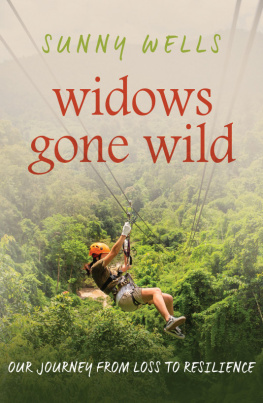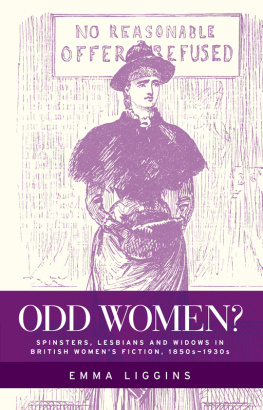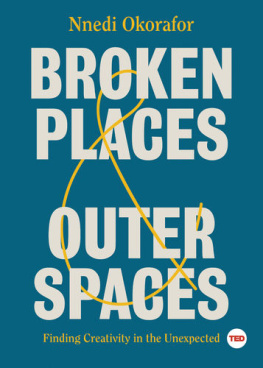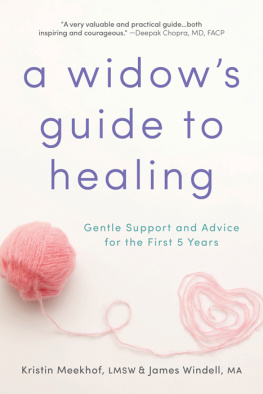Lesbian Widows
Invisible Grief
Lesbian Widows
Invisible Grief
Vicky Whipple
First published by
The Haworth Press, Inc., 10 Alice Street, Binghamton, NY 13904-1580
This edition published 2013 by Routledge
711 Third Avenue, New York, NY 10017
2 Park Square, Milton Park, Abingdon, Oxon OX14 4RN
Routledge is an imprint of the Taylor & Francis Group, an informa business
2006 by The Haworth Press, Inc. All rights reserved. No part of this work may be reproduced or utilized in any form or by any means, electronic or mechanical, including photocopying, microfilm, and recording, or by any information storage and retrieval system, without permission in writing from the publisher.
PUBLISHERS NOTES
The development, preparation, and publication of this work has been undertaken with great care. However, the Publisher, employees, editors, and agents of The Haworth Press are not responsible for any errors contained herein or for consequences that may ensue from use of materials or information contained in this work. The Haworth Press is committed to the dissemination of ideas and information according to the highest standards of intellectual freedom and the free exchange of ideas. Statements made and opinions expressed in this publication do not necessarily reflect the views of the Publisher, Directors, management, or staff of The Haworth Press, Inc., or an endorsement by them.
Most identities and circumstances of individuals discussed in this book have been changed to protect confidentiality. In a few cases, individuals have given permission to use their names and circumstances.
Cover design by Lora Wiggins.
Library of Congress Cataloging-in-Publication Data
Whipple, Vicky.
Lesbian widows : invisible grief / Vicky Whipple.
p. cm.
Includes bibliographical references and index.
ISBN-13: 978-1-56023-330-5 (hc. : alk. paper)
ISBN-10: 1-56023-330-3 (hc. : alk. paper)
ISBN-13: 978-1-56023-331-2 (pbk. : alk. paper)
ISBN-10: 1-56023-331-1 (pbk. : alk. paper)
1. LesbiansPsychology. 2. WidowsPsychology. 3. Lesbian couplesCase studies. 4. WidowhoodCase studies. 5. Bereavement. 6. Grief. 7. Homophobia. I. Title.
HQ75.55.W45 2005
155.937086643dc22
2005024814
This book is dedicated to MC
with gratitude for the time we shared.
ABOUT THE AUTHOR
Vicky Whipple, EdD, is an associate professor in the Counseling Department at National-Louis University where she has developed and taught a course on counseling LGBT clients. She is also a licensed clinical professional counselor in Illinois where she has had a private practice for the last fifteen years specializing in womens issues and the LGBT population. Dr. Whipple has published articles in professional journals and presented workshops at professional conferences on battered women, feminist family therapy, gender identity, and now lesbian widows. She is a member of the American Counseling Association and is a nationally certified counselor and an approved clinical supervisor. Dr. Whipple is also a clinical member and approved supervisor for the American Association for Marriage and Family Therapy.
CONTENTS
This book is based on a qualitative research study that I conducted as a participant-observer. Being a participant-observer means that I did this research and wrote this book as an insider. That is, I was a lesbian widow interviewing other lesbian widows. In qualitative research, objectivity is not the goal, and I most definitely was not able to be impartial about collecting widows stories and writing this book. As a participant-observer, I was not emotionally removed from the topic, and I brought my own personal experience to the research.
Since I am a college professor, I went through appropriate channels at my university to obtain official sanction to conduct research using human subjects. All of the subsequent participants signed an informed consent form allowing me to use the information they sent me in this book, in journal articles, and in presentations at conferences. In this document I explained what I was doing and how I would use a pseudonym to protect their privacy if they wished. I also informed them of the risks involved, the primary one being that writing about the death of their partner would probably be emotionally stressful. But I also suggested that the benefits of participating would outweigh the risks. It could be cathartic for them as well as helpful to other lesbians who were widowed. Jane e-mailed me, saying, Thank you for your work and the opportunity to possibly help others. You are right to say that the process of filling out the questionnaire is somewhat healing. Certainly it is thought-provoking.
I advertised in Lesbian Connection and other resources, asking for lesbian widows willing to complete a questionnaire or be interviewed about their experiences. Women contacted me mainly by e-mail, but also by telephone and letter. With the majority I engaged in at least one, and often several, interactions. Over the course of a year, I received responses from sixty-two women from all over the United States. In the end, twenty-four women, living in thirteen different states, followed through and completed a questionnaire.
One of the first women who contacted me happened to live only a couple of hours away from me, so I asked her if I could interview her in person. She had already written out her answers but agreed to the interview. I thought that the more women I could interview in person or by phone, the better. I was surprised to find otherwise. After interviewing Maureen, I transcribed the tape and discovered that she had basically told me verbally what she had already written. Plus, the interview had taken a great deal of time since we kept going off on tangents. I also found myself emotionally drained by the encounter.
In addition to this experience of interviewing one widow in person, I found that when I offered the opportunity to be interviewed, the women who contacted me preferred to write their responses to the questionnaire or to make audiotapes of their answers. No one wanted to be interviewed in person, I think because they knew it would be too emotional for them. I had a graduate student assist me with transcribing some of the tapes sent to me, and she said that the women on the tapes kept stopping and crying. Although relying on written or taped responses created some problems, that is, not everyone answered every question, I believe each widow shared the essence of her experience and what she thought might be helpful to others.
I invited participants to answer five general questions in their own words. Based on Seidmans (1991) guidelines for phenomenological interviewing, I first asked them to tell me the story of their relationship so that I might have a sense of the context in which they had lived together. (Thus, the internal validity or consistency of the research was enhanced.) I asked them to tell me about the illness, if any, and death of their partner. I wanted to know about their own grief journey afterward, including what or who helped them and what or who was not helpful. I asked how long it had been since their partner had died and where they thought they were now emotionally in the grief recovery process. Finally, I wanted to know what they believed they had learned from this experience and what advice they might give to others in the same situation.









